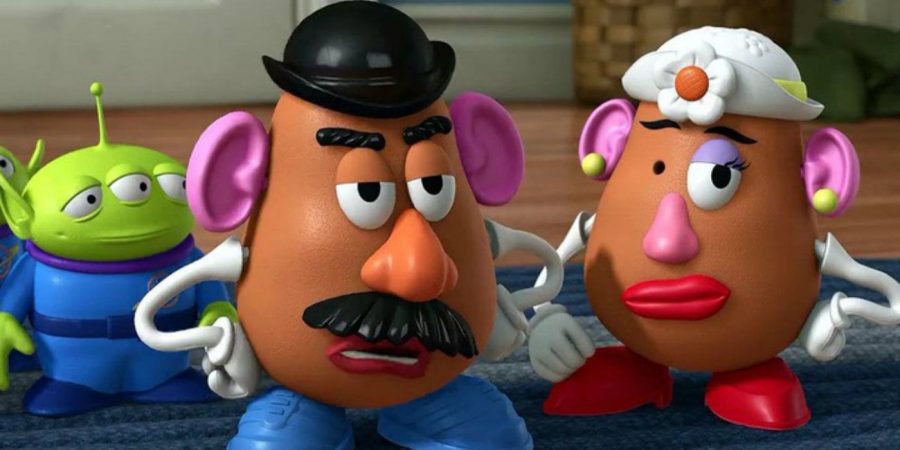Mr. Potato Head and the war against wretched
A screencapture from Pixar’s “Toy Story” featuring Mr. and Mrs. Potato Head.
Did you know that the first Mr. Potato Head didn’t have a head? Originally, it was sold in separate pieces meant to be fitted to a real vegetable. Due to complaints regarding rotting vegetables and new government safety regulations, the major corporation Hasbro began including a plastic potato body with the toy set in 1964. 72 years later, the multinational toy company, based in Rhode Island, has decided to strip the “Mr.” from Mr. Potato Head.
Hasbro has made a conscious decision to rebrand in a way that will promote inclusiveness: by making the classic Potato Head gender neutral. They have also promised the original Mr. and Mrs. Potato Head won’t be going anywhere, as they have decided to market them as characters to the brand.
The move comes as they work to avoid being “cancelled” in a society determined to do away with anything seen as “bad” and maintain the upper hand against competitor their Mattel, which has taken steps toward making their Barbie brand more inclusive. Mattel’s diversity proved successful for the company and changed their tides for the better. Attempting to maintain this upper hand means Hasbro must diversify their products to be more inclusive to today’s children, who are a lot more open-minded when it comes to gender.
This decision has led to backlash from those on the right, who tend to believe that diversity should be left out of matters that typical conservative values deem sacred: school, religion, family etc. A poll released in March 2021 showed that 65 percent of Americans believe corporate America is taking political correctness too far. Many conservative news sources also believe that Hasbro may not be aware of their audience’s priorities.
A similar pattern can be seen in the continued success of Dr. Suess’ books, which have seen increasing popularity while the value of the author’s work is debated. On Mar. 5, 2021, “The Cat in the Hat” was the bestselling book on Amazon’s U.S. store, closely followed by “One Fish Two Fish Red Fish Blue Fish” and “Green Eggs and Ham.” Many of these books contain insensitive materials, yet they continue to remain popular.
One might make an educated guess that the people buying these books aren’t aware of their racist nature; however, much more likely in my opinion, the people keeping these books at the top of the bestseller list take no offense at the author’s words. This assumption has led to conservatives making the argument that “real culture” will prevail over “cancel culture” in the war on censorship; however, they fail to realize they are in an echo chamber: a space where you are only exposed to people who “echo” your own beliefs.
Although it is up for interpretation, a closer look might reveal to you that most Americans could care less about the negative history associated with the authors’ books and are many times more interested in focusing on the positive ideas that can be reaped from them. Dr. Seuss Enterprises has consequently announced they will be discontinuing the sale of a handful of the author’s children’s books in America, due to the insensitive nature of said literature—a stark contrast to their position in recent years as they had spent hours upon hours defending the late author’s works.
Hasbro has taken a different approach to this situation. Attempting to cater to both sides of the aisle, Hasbro has vowed the Mr. and Mrs. Potato Heads we know and love aren’t “going anywhere!” This is because Hasbro realizes by fully embracing one political side of the aisle, they cut off the other. Politics have begun to play a big part in the decisions of American companies who wish to gain the favor of the shifting majority. After all, that’s where the money is.
A conservative would tell you the issue with Hasbro’s decision is that it infringes on the rights and values of traditional conservative and Christian beliefs. A person on the left would say it’s about being supportive of diversity in an all too often judgmental society. An executive would tell you it’s just a wise business decision, and I’m sure I don’t have to tell you which of the three makes decisions for Hasbro.
Your donation will support the student journalists of Neuqua Valley High School. Your contribution will allow us to print our next newspaper edition as well as help us purchase equipment and cover our annual website hosting costs.







